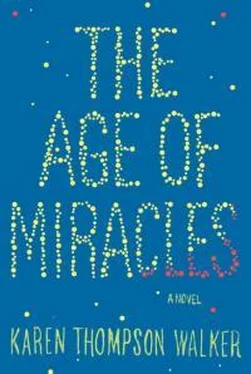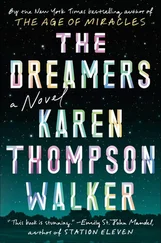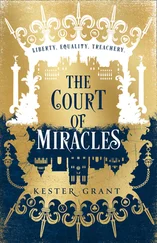“You should have answered your phone,” she said. “You should have called me back.”
The air conditioner was blasting in the car. News about the eclipse was streaming from the car radio.
“Are you listening to me?” my mother said, her voice rising as we waited in a line of slow-moving cars, waiting for the crossing guards to wave us out of the school parking lot.
I was watching a swarm of kids through the window. They seemed suddenly distant out there on the quad. I traced my finger on the glass.
“Hanna moved to Utah,” I said. I had known for two days, but this was the first time I mentioned it to my mother.
She turned toward me. Her expression softened. A red Mercedes squeezed past our car.
“She moved?”
I nodded.
“Oh, Julia,” said my mother. She reached over and squeezed my shoulder. “Really? Are you sure it’s permanent?”
“That’s what she said.”
We headed toward the freeway. I could feel my mother glancing at me as she drove. She turned the radio down.
“I think they’ll come back,” she said.
“I don’t,” I said.
“People are scared right now,” she said. “You know? They’re not thinking straight.”
When we got home, we discovered that the garbage cans my father had wheeled out to the curb that morning were still heaping with trash. The garbageman had not shown up to collect, but the ants and the flies were busy. The bird was still in there. We rolled the garbage back into our side yard and unloaded the groceries from the car. My mother had bought several boxes of canned food, six jugs of bottled water. She suspected that shortages were on the way—and she wasn’t the only one who thought so.
That night my father claimed he’d understood right away that the eclipse was an eclipse and nothing more.
“You’re telling me that you weren’t afraid even for a single second?” asked my mother.
“Not really,” he said. “I knew what it was.”
The nightly news was dominated by the story and featured a handful of eclipse enthusiasts who, before the slowing started, had traveled to a remote Pacific island, one of the few specks of dry land from which it was supposed to be possible to view the total solar eclipse. These people had packed expensive camera equipment in their luggage, special filters designed for capturing pictures of vanishing suns. But their tools sat unused in cushioned cases. Their special filters were unnecessary, their protective glasses remained folded in chest pockets, never used—the eclipse struck the West Coast instead.
That night the baseball playoffs went on without interruption. To play on in the face of uncertainty seemed the only American thing to do. But that night’s game was terrible. It was harder than ever to defy gravity. Seven pitchers were pulled. No one could hit. With each new hour, every bit of matter on the earth was more and more fettered by gravity.
It seemed the stock market, too, was subject to the same downward pull, having plunged to a record low. The price of oil, on the other hand, was shooting upward.
By the time I climbed into bed that night, we’d gained another thirty minutes. All the television stations had added perpetual crawls to their screens, which reported, instead of stock prices, the changing length of a day on earth: twenty-six hours, seven minutes, and growing.
The days passed. More and more people drained away from our suburb. They fled to wherever they were from, and this was California—almost everyone had migrated here from someplace else. But my family stayed. We were natives. We were home.
On the third day, my mother and I drove out to my grandfather’s house after school.
“He says he’s okay,” my mother said as she drove. “But I want to make sure.”
He was my father’s father, but it was my mother who worried over him most. I had begun to worry about him, too—he lived all alone out east.
We stopped at a gas station on the way and discovered a long line of cars, waiting for the pumps. Dozens of minivans and SUVs formed a chain that overflowed the parking lot and wrapped around the street corner.
“Jesus,” said my mother. “This line looks like something out of a war zone.”
A woman in a pink-floral-print dress hurried between the cars, slipping orange flyers beneath windshield wiper blades as passengers looked away: The end is now! Repent and save yourself!
I avoided her eyes as she passed, so frantic and so sure, but she sought out mine and paused at my window to shout through the glass: “And the Lord God said, ‘On that day, I will make the sun go down at noon and darken the earth in broad daylight.’ ”
My mother flicked the lock on the doors.
“Is that from the Bible?” I asked.
“I can’t remember,” my mother said.
We inched forward slightly. I’d counted nineteen cars ahead of ours.
“Where is everyone going?” asked my mother. She rubbed her forehead and exhaled. “Where is there to go?”
My grandfather lived in the middle of a luxury housing development. His old house was a holdout against the new surroundings. Once off the freeway, we drove through a network of fresh black streets, sliced at every corner by a shimmering white crosswalk. The stop signs were new. The speed bumps were new. Everything here was new. Curbs remained sharp and unscuffed. Fire hydrants stood gleaming and rust-free. Rows of saplings grew at evenly spaced intervals along the sidewalks, and the sidewalks literally sparkled. All the houses had lawns like thick heads of hair.
Amid all this newness, my grandfather’s dusty acre persisted, invisible, like a patch of dark matter: You could tell it existed from the way the roads curved around it, but you couldn’t see it from the outside. You only sensed it. The developer of the neighboring community had planted thick pine trees on every side of my grandfather’s lot, so the neighbors could avoid looking at it.
We drove through my grandfather’s open wooden gate, where the smooth asphalt turned to chunky gravel beneath our tires and the carefully planned green spaces of the development gave way to the region’s natural landscape: scraggly and dry, barren and brown and unlovely. My father had grown up on this land in an age when there were chickens and horses here. But the last horse had long since died, and now the stable stood like a relic of an ancient era. The wooden fence posts and crosspieces lay bleaching in the sun. The chicken coop was empty of chickens. My grandfather was eighty-six years old. All his old friends were dead. His wife was dead. He had grown bitter about his own longevity.
“Just hope you didn’t inherent my genes, Julia,” he said to me often. “It’s a curse to live too long.” I liked the way he always said exactly what he thought.
Years earlier, the developers had tried to buy my grandfather’s property. But he refused to sell. “Dammit,” he said, “I got things buried in this land.” I knew that at least two cats had been interred out behind the woodpile, and I suspected he had also buried certain other valuables over the years. The developers went ahead without him, laying roads and foundations around him, erecting houses and street signs on every side of his property. The new neighborhood rose up around my grandfather’s land like flood-water surrounding high ground.
My mother and I walked into the kitchen without knocking. When you moved around in this house, the shelves rattled slightly, knickknacks teetering on every surface. My grandfather was sitting at the table in a red sweatshirt, the newspaper and a magnifying glass in front of him.
“Hi, Gene,” my mother said. “How are you doing?”
“I told you on the phone I’m fine,” he said without looking up. “Chip’s been here.”
Читать дальше












